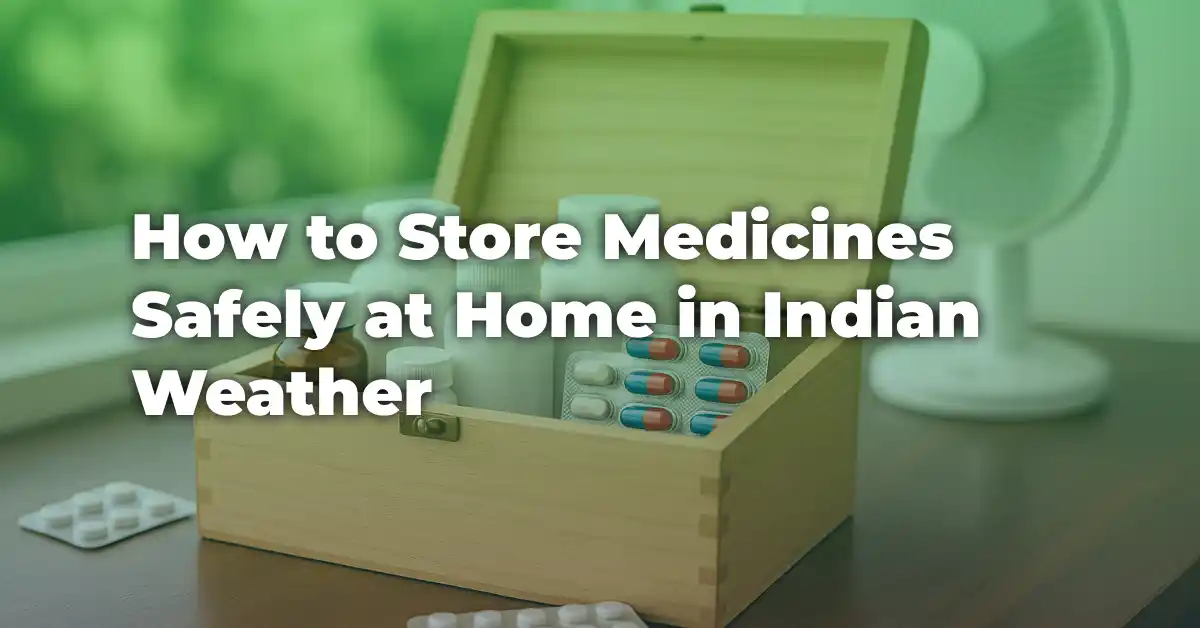Your Medicine Might Not Be Working Like You Think
We all have a medicine drawer (or cupboard) at home—paracetamol, cough syrups, a few antibiotics, maybe even insulin or eye drops. But here’s something we don’t always think about: Are we storing them correctly?
Especially in India, where the weather swings from scorching summers to heavy monsoons, improper storage can reduce the effectiveness of medicines—or worse, make them harmful.
That’s why it’s so important to understand how to store medicines safely at home in Indian weather. Let’s walk through the basics so you can keep your family safe and your medicines working the way they should.
Heat and Humidity Are Your Medicine’s Worst Enemies
If you’re wondering why proper storage matters so much, here’s the simple answer: heat and moisture break down medicine.
And let’s face it—Indian summers can easily cross 40°C, while monsoon brings high humidity into every corner of your home.
This can:
- Reduce potency
- Cause tablets to become sticky or discolored
- Lead to bacterial growth in syrups or drops
- Even make medicines toxic in rare cases
So when thinking about how to store medicines safely at home in Indian weather, rule #1 is to avoid kitchens, bathrooms, and window sills. These spots may seem convenient, but they’re often the worst for your meds.
Stick to a Cool, Dry, and Dark Spot
Most medicines don’t need to be refrigerated, but they do need to be:
- Below 25°C (or room temperature)
- Away from sunlight
- In a dry environment
A high shelf inside a cupboard in your bedroom or hallway is usually ideal.
Some specific tips:
- Keep blister packs in their original boxes
- Don’t remove cotton or silica gel from bottles—they absorb excess moisture
- Store syrups upright with caps tightly closed
This simple setup is one of the best answers to how to store medicines safely at home in Indian weather—and it doesn’t cost you anything extra.
What About Refrigerated Medicines?
Some medicines—like insulin, some eye drops, and certain antibiotics—do need to be refrigerated. But not frozen.
Here’s what to keep in mind:
- Store them in the main compartment, never in the door (temperature there fluctuates)
- Keep them in a separate box to avoid contamination from food
- Don’t use them if they’ve frozen accidentally during a power cut
If you travel frequently, carry a small cooler or insulated pouch to keep temperature-sensitive meds stable on the go.
Always Check Expiry Dates and Labels
This may sound basic, but it’s often overlooked.
Always:
- Check expiry dates regularly and safely discard anything past its date
- Read the storage instructions on the label—it may vary from brand to brand
- Keep a small notepad or checklist near your medicine box for quick tracking
Even if the packaging looks fine, expired or improperly stored meds can lose their effect—or even harm you.
Smart Storage = Safer Health
Knowing how to store medicines safely at home in Indian weather isn’t about overthinking—it’s about being smart.
The climate can change fast, but with a few simple storage habits, you can make sure your medications stay safe, effective, and ready when you need them most.
Contact Us : https://paxterlifesciences.com/
Follow Us : https://www.instagram.com/paxter_lifesciences/






